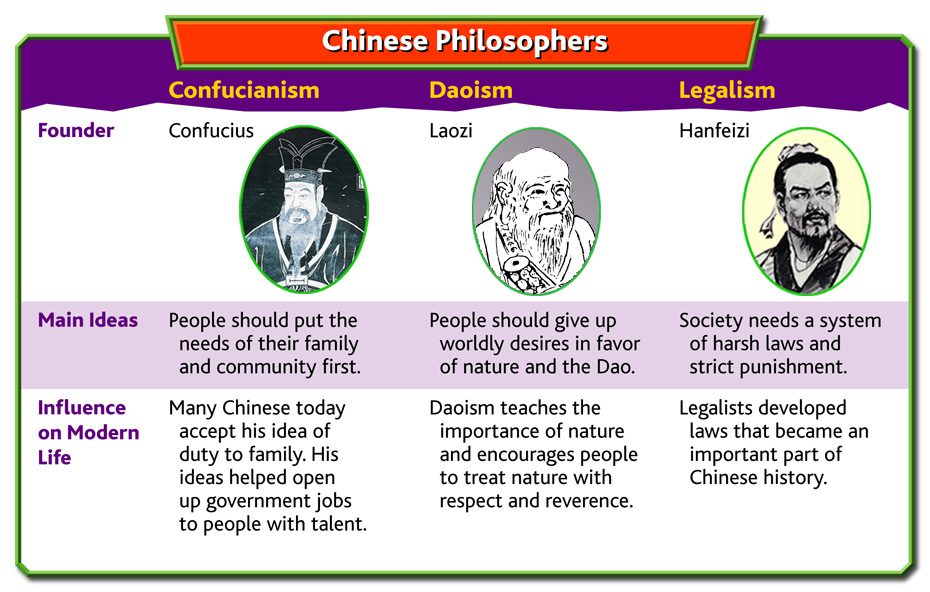Confucianism and Taoism are two of the most influential philosophical schools in China. Confucianism emphasizes social and moral order, focusing on virtuous living and respect for authority, while Taoism emphasizes individual freedom and harmony with nature, focusing on self-cultivation and achieving inner harmony. Confucianism believes in good governance, while Taoism sees government as a source of oppression. Confucianism places a high value on education, while Taoism emphasizes meditation and self-reliance. Despite some similarities, they have fundamental differences in their beliefs and values, both of which have had a significant impact on Chinese culture and society.
Confucianism vs. Taoism: Comparing Two Chinese Philosophies
Introduction
Philosophy has always been an indispensable aspect of Chinese culture, dating back to the early times of civilization. Two of the most influential philosophical schools in China are Confucianism and Taoism. Both originated in China and have profoundly impacted the Chinese culture, tradition, and belief system. They share a lot in common, but there are some fundamental differences between them. This article will compare and contrast Confucianism and Taoism in detail.
Origins and Founders
The founder of Confucianism was the philosopher Confucius, who lived around 500 B.C. in the state of Lu. Confucianism began as a moral and ethical philosophy, and it focuses on how individuals can achieve a harmonious society by living virtuously and respecting each other.
Taoism, on the other hand, was founded by Lao Tzu, who was a contemporary of Confucius. The exact dates of his birth and death are not known, and even his existence is questioned by some scholars. Taoism originated as a philosophical and spiritual tradition that emphasized living in harmony with nature and finding balance in life.
Beliefs and Values
Confucianism is based on three central values, which are Jen (benevolence), Li (morality), and Yi (righteousness). Jen teaches individuals to be compassionate and treat others with kindness and respect. Li emphasizes the importance of righteous behavior, which is necessary for developing a virtuous character. Yi stresses the need for individuals to uphold laws and behave morally in society.
Taoism, on the other hand, is based on the concept of Tao, which translates to “the way.” Taoism teaches that individuals should live in harmony with nature and be in tune with the flow of the universe. It emphasizes simplicity, humility, and non-attachment to material things. Taoism also stresses the importance of Yin and Yang, which are two opposing forces that must be balanced to achieve harmony.
Role of Government
Confucianism believes that good governance is essential to achieving social harmony. It advocates for a hierarchical society where everyone has a clear role to play based on their position in society. The ruler must lead by example, and his actions should be guided by moral principles. The Confucian concept of the Mandate of Heaven states that the ruler has the divine right to rule, but his position is subject to the moral standards of his people.
Taoism, on the other hand, sees government as a source of oppression and believes that individuals should be free to follow their own path. Taoists advocate for a government that is minimalistic and promotes individual freedom. They believe that individuals are naturally good and that government interference only serves to corrupt them.
Views on Education
Confucianism places a high value on education, and Confucius believed that education was the key to creating a just society. He believed that individuals should adhere to strict moral standards and learn to be respectful and obedient to authority. Education was viewed as a means of achieving social and moral improvement.
Taoism, on the other hand, emphasizes self-cultivation, and the attainment of wisdom through contemplation and meditation. Taoists believe that individuals should be self-reliant and not rely on external sources for guidance. Their focus is on developing a deep understanding of the Tao and achieving inner harmony.
Conclusion
In conclusion, Confucianism and Taoism are two of the most significant philosophical traditions in Chinese culture. Although they share some similarities, they have distinct differences in their beliefs and values. Confucianism emphasizes social and moral order, while Taoism emphasizes individual freedom and harmony with nature. Confucianism emphasizes education and respect for authority, while Taoism emphasizes self-cultivation and inner harmony. Both have had a significant impact on Chinese culture and society and have influenced the way individuals view themselves and their relationship with the world around them.
